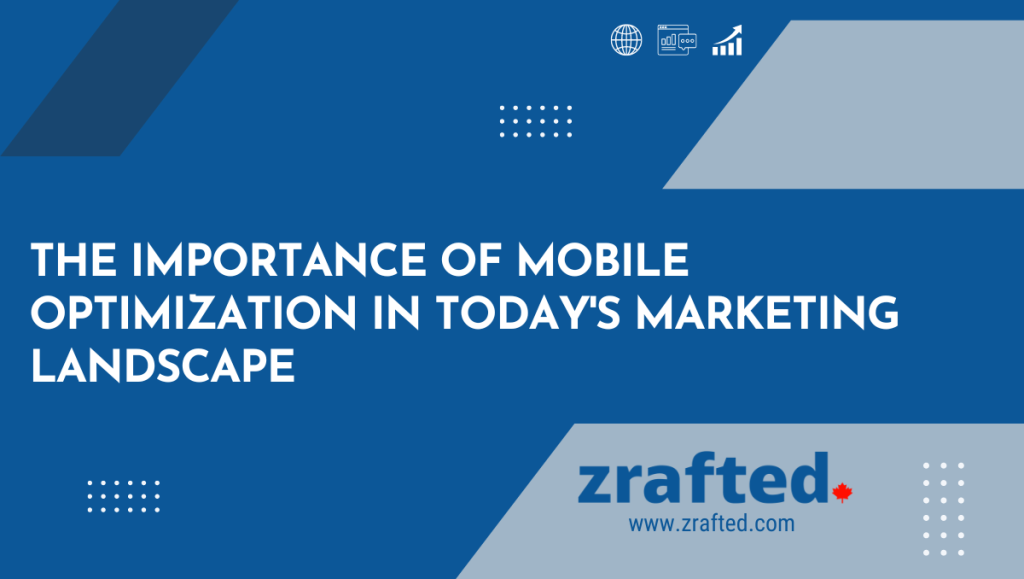Why is Mobile Optimization Important?
In the realm of website design, accessibility, and usage, it is evident that the mobile experience plays a pivotal role. Web design originated during the era when desktop computers were the prevailing equipment for accessing websites. However, mobile devices have now become the predominant means by which people access websites. Many consumers search for and visit your website primarily using devices like smartphones and tablets because they are so common.
Consider this: you can access the newest culinary fads, find directions to a hip new restaurant, and even read the news right from the palm of your hand. Indeed, mobile devices now account for more than 60% of all online searches. This transformation is remarkable and is fundamentally transforming the digital landscape.
If a website lacks mobile optimization, it effectively becomes unnoticeable to a vast audience. This blog post aims to examine the significance of mobile optimization for websites, assisting individuals in achieving proficiency in the mobile-first era.
What is mobile optimization?
Mobile search engine optimization (SEO) refers to the systematic approach of enhancing the performance of a website in order to provide users with an outstanding experience and attain improved search rankings, particularly on mobile platforms.
This optimization process encompasses several key elements:
- Responsive design refers to the practice of ensuring that a website’s appearance and content are automatically adjusted to seamlessly fit on various screen sizes, ranging from smartphones to tablets.
- Fast loading speeds refer to the process of optimizing graphics, text, and code in order to enhance the speed and efficiency of a website’s loading on mobile networks.
- The implementation of touch-friendly features involves the creation of buttons, menus, and forms that possess the ability to be quickly clicked and navigated using fingertips, as opposed to cursors.
- Local SEO refers to the process of enhancing a website’s visibility and relevance for mobile consumers who are frequently on the move.
- The use of structured data involves the incorporation of markup that facilitates search engines in comprehending the material and presenting it prominently within mobile search results.
Why Does Mobile Optimization Matter?
Let us examine the current behavior of customers in digital environments. As to the Pew Research Center on the Internet and Technology, there is a growing trend of Americans using mobile devices. Examine the following data regarding mobile usage:
- Ninety-six percent of people own a smartphone.
- 81% of people own a smartphone, compared to 35% in 2011.
- Nearly 75% of people have a laptop or desktop.
- About half have an e-reader, and almost half own a tablet.
- Approximately 25% of American adults primarily use a smartphone to access the Internet.
The truth is that almost everyone you are attempting to reach has a smartphone.
The importance of mobile optimization for your website
Ignoring mobile SEO in today’s world of smartphones is like creating a highway without on-ramps. It just doesn’t work for the vast majority of consumers who use their smartphones and tablets to access the internet. However, mobile SEO is much more than just making your content accessible; it’s a calculated investment that pays off in a number of ways for your whole online presence. Here are some of the main causes:
Enhanced user experience
Regardless of the device they’re using, today’s mobile users demand a smooth and simple experience. Users of mobile devices often feel frustrated with websites meant only for desktop users, akin to attempting to negotiate a maze while in the dark. Users become extremely tired with your site quickly and leave due to crammed layouts, mouse-only buttons, and tiny fonts. Touch-based interactions have distinct requirements, therefore mobile SEO places a premium on a seamless user experience.
Consider simple, tappable components that react right away to even the smallest touch. Visually appealing content that has been resized to fit smaller displays so people can comfortably read it without having to pan and zoom. Envision a smooth, intuitive navigation system that leads consumers naturally to their intended location, be it product browsing, locating contact details, or completing a transaction. This smooth experience promotes interaction, motivates investigation, and eventually raises the possibility of conversion. Recall that satisfied consumers are more likely to become devoted supporters of a brand and lifelong customers.
Improved search engine rankings
By making sure your website is mobile-friendly, search engines will continue to find and index it, increasing organic traffic and directing prospective clients to your door. A high search engine results page (SERP) rating is essential for online success in today’s mobile-first environment. You can take advantage of this significant benefit by giving mobile SEO top priority and putting your website in front of the right people at the right time.
Increased mobile traffic
Consider all of the times you have looked up for product information, located a restaurant nearby, or compared prices on your phone. It’s what your prospective clients are doing as well: using their mobile devices to conduct information searches, make decisions, and eventually complete purchases. By positioning your website as an easily accessible resource, mobile SEO attracts users’ attention just when they need it—during their critical problem-solving moments.
Higher conversion rates
A mobile-friendly website aims to produce results in addition to improving aesthetics. Research indicates that mobile-optimized websites have substantially greater conversion rates than non-optimized ones. More leads, more sales, and eventually more money for your company . However, how can mobile SEO achieve this?
First of all, it removes obstacles from the user’s route. Quick loading speeds guarantee that users don’t have to wait, which reduces user annoyance and abandonment. By ensuring that content is readable and accessible across all screen sizes, responsive design does away with the necessity for panning and zooming. Simple navigation leads visitors to the needed activities with ease, be it buying something, subscribing to a newsletter, or getting in touch with your company.
Final Thoughts
The advantages of mobile optimization are manifold, ranging from improving user experience and search engine rankings to expanding one’s audience. Conversely, the costs of ignoring mobile optimization are irreversible. You will thus be well on your way to digital marketing success in the mobile era if you make sure that your website, content, and campaigns are mobile-friendly.
Lorem ipsum dolor sit amet, consectetur adipiscing elit. Ut elit tellus, luctus nec ullamcorper mattis, pulvinar dapibus leo.





